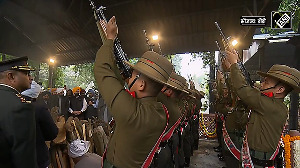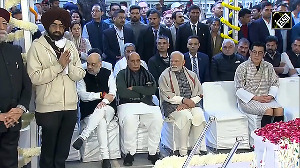India will persist with their new strategy of fielding five frontline bowlers in Tests, according to coach Greg Chappell who believes the five-bowler theory is the only way his team can win more matches.
Chappell also sees a key role for his young pace battery in improving India's floundering reputation in the longer version of the game, which he says, is possible if the team "replicates the lessons of our one-day success in Tests".
"It's the bowlers who win Tests and we all know that. I am convinced that India needs to persist with the five-bowler theory in order to win more Test matches," Chappell said.
The former Australian captain expects his young fast bowlers to step up to the task and excel in Tests as well.
"It's an opportunity for them to seize the moment and prove themselves in demanding conditions," he said.
Chappell's eyes looked blood-shot with the trip across continents, yet the importance of the series goaded him into summoning computer analyst Ramakrishnan and bio-mechanist Ian Fraser for an impromptu computer session within a couple of hours of checking in at the hotel.
Irfan Pathan, Munaf Patel, S Sreesanth and Rudra Pratap Singh carry the torch of India's fast bowling challenge. All are young but for experience they can only draw upon the lessons learnt by Ajit Agarkar.
Chappell, however, expects them to make light of hot and humid conditions as well as of wickets which might not be of great assistance in terms of pace or movement. There is also this little matter of bowling to the irrepressible Brian Lara.
"If they are uptight about bowling to Lara, I don't know. But individuals don't matter as long as you stick to the process. In any case I'm not too keen to dwell on the negatives at the start of the tour," remarked Chappell.
An elementary part of this "process" for Chappell is that bowlers should dry up the scoring and build up the pressure on opposition batsmen.
"It surely is important if bowlers can build pressure from both the ends. It adds to a team gaining control of the situation."
India have made a complete reversal of their fortunes in one-day cricket under Chappell but its stock has fallen in the longer version of the game. Rahul Dravid's men are still smarting under defeats by Pakistan and England in the first four months of the year.
"It would be good if we could replicate the lessons of our one-day success in Tests but it is also worth remembering that compared to 25 one-dayers, we have played only eight Tests in the same period," Chappell said.
"It takes time to understand the particular rhythm of Test cricket. It doesn't happen instantly. I'm hopeful the boys would come to grips with it soon."
Chappell felt it is only a "bonus" for his young team to get first-hand experience of these conditions which would come handy during the World Cup next year.
He said it is worth keeping an eye on West Indies' fast bowling resources since they had a few talented youngsters in the line-up.
"But there is no reason to believe that our batsmen wouldn't be up to the task. How well we would do, who knows."
Chappell ruled out any nets or practice on Sunday and would rather have boys recover their wits for the arduous battle ahead.
The Indians spend the next two days in Kingston before flying to Montego Bay for a practice match against a local eleven.







 © 2024 Rediff.com -
© 2024 Rediff.com -